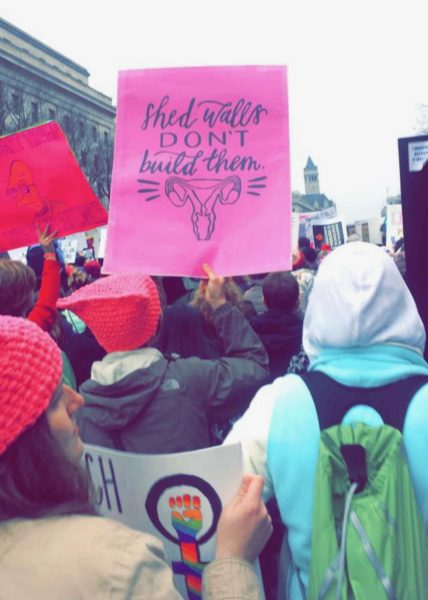Faced with Trump’s second presidency, marginalized groups once again fear for their rights.
Trump’s first term separated immigrant families and enacted a a travel ban directed at Muslim Countries. Trump opposed the Equality Act, a bill that would have not only expanded civil liberties,
but also opposed discrimination while adding protections for LGBTQ+ people. He banned transgender people from serving in the military and implemented the “Deploy or Get Out” policy, which removed service members who were living with HIV.
Trump’s imminent second presidency, combined with Republican majority control of both the Senate and the House of Representatives, bodes ill for democracy.
Trump has vowed to mass-deport undocumented migrants, going so far as to state he will deploy the U.S. armed forces on day one. Other campaign promises include cutting federal funding to schools that teach “critical race theory” and “transgender” issues, which he calls “transgender insanity,” as published in a CBS article which lists some of Trump’s campaign promises. If you, your family or friends fear what the Trump administration will bring, here are a few options that could empower you to protect yourself and your family.

For Undocumented Immigrants:
Be sure you know your immigration status and call the Immigration Court Hotline at 1-800-898-7180 to check on your case. Many free legal resources are available online at the ACLU website and at the Immigrant Legal Resource Center (ILRC).
The Department of Justice Executive Office for Immigration Review (EOIR) maintains a list of attorneys or legal service organizations that provide pro bono (free) legal services.
The Immigration Advocates Network (IAN) National Immigration Legal Services Directory maintains a national directory of nonprofit organizations that provide free or low-cost immigration legal services.
If you need to search for immigration lawyers near you, the American Immigration Lawyers’ Association (AILA) can help you do so. Many legal aid organizations and civil rights groups are free or low cost, and are ready to help.
Be sure to keep all of your documents together in a safe place, memorize important phone numbers and prepare a safety plan for your family.
Remember, you DO NOT have to open the door to your home to authorities without a warrant. This is because of the fourth amendment that states you are protected from unreasonable searches and seizures. A valid warrant, signed by a judge, is needed to enter your home unless consent is given. Be sure to exercise your right to remain silent. If I.C.E. shows up you do not have to reveal your immigration status to them. You can ask for an attorney, and your due process rights allow you to have your day in court and be represented by an attorney. For more information, refer to the ACLU, Know Your Rights | Immigrants’ Rights page.
Another source, is the Save the United We Dream hotline at 1-844-363-1423. Remember, knowledge is power. Know your rights, advocate for yourself and stay safe.
For LGBTQ+ People:
For the LGBTQ+ community, a second Trump term brings about great uncertainty. If the predictions for Project 2025 are true, what the manifesto states erase protections for the community.
During Trump’s first term he rolled back Obama-era non-discrimination protections and in the years since he first served, more than 500 anti-LGBTQ+ bills have been enacted, as shown by the Human Rights Campaign.
Protections that will be placed on the chopping block come January include federal funding that helps with gender-affirming care, workplace protections, and words that people use to self-identify, such as “sexual orientation and gender identity (SOGI), diversity, equity, and inclusion (DEI), gender, gender equality, gender equity, gender awareness, gender-sensitive, abortion, reproductive health, reproductive rights” as reported in an article written for Axios.
When it comes to healthcare for LGBTQ+, especially for those requiring gender-affirming care, it’s important to keep all of your documentation for medical care together and to refill prescriptions when possible.
Keep copies of your legal name change and gender-change documents, and update passports or IDs if needed.
Be sure to save contact info for LGBTQ+ shelters and community centers you can go to.
For LGBTQ+ couples who are married or plan on doing so, make sure to get any legal protections in place for you and your partner. Secure power of attorney and any other needed health-related directives. Update beneficiary designations and update living trusts and wills. Collect your marriage or domestic partnership documents and create digital and print copies. If you need any advice for further protections, reach out to organizations like Lambda Legal and National Center for Lesbian Rights for help.
Keep guardianship documents for kids secure and/or have your second-parent adoption completed.
If you or someone you know is struggling with what this next presidential term may bring, please contact organizations like The Trevor Project, It Gets Better or GLAAD’s LGBTQ+ resource list for support.
This community is well-versed in fighting for rights. Remain firm, stay connected and continue to be each other’s safety net for the uncertain times ahead.
For Women:
Trump took actions during his first term that specifically affected women’s health. He went after the Affordable Care Act and took away provisions for women, including cost-free birth control. During this time he also successfully appointed three U.S. Supreme Court justices who later helped overturn Roe v. Wade, which ended federal protections for abortion rights.
With many states now restricting or banning abortions, women have found themselves in not only dangerous situations, but fatal ones. Doctors whose hands are tied because of confusing laws in states with bans have left many women without the proper and necessary care, as reported in an article in the Intelligencer.
For women, especially with regards to reproductive care, it will be important to understand the laws in your state for any legal medications you may need and what may be available to you. If care is unavailable for you in your state then you will need to know about any and all travel restrictions there may be between certain states if you must cross state lines for care.

Requests for long-term birth control, abortion pills and even permanent sterilizations have already increased since Trump was re-elected. Doctors have even suggested getting replacements for IUDs and restocking on birth control as a way to help combat the restrictions that may take place once he is back in office, as reported by Time magazine.
Some emergency contraceptives, like Plan B and abortion pills like mifepristone or misoprostol, may be available online through telehealth, just be sure to check with your insurance. You can also find over-the-counter birth control in stores like Walmart, Costco, Walgreens and CVS.
According to what is laid out in Project 2025 under the Trump administration the government could look to collect data on abortions. Any states that would refuse to share that information could possibly have federal funds withheld. Another item outlined in the manifesto would be to use the Comstock Act to possibly eliminate access to abortion pills and materials required for care by banning the mailing of these items.
Those worried about the possible collection of data, especially those in states with bans or limited access for abortion care, could use a VPN or encrypted period tracking app like Clue. Clue has stated they don’t have to share data with US authorities because they are based in the EU. The National Partnership for Women & Families discusses how data privacy and reproductive freedom are not only linked, but now have an added risk post the Dobbs decision.
The fight for equity for women doesn’t stop with the upcoming administration. In the words of Kamala Harris: “No woman should be told she can’t make decisions about her own body. When women’s rights are under attack, we fight back.”
There’s reason for concern over another Trump presidency, especially for these marginalized groups. For some, survival will be the goal, as the risk of what this administration can bring is too real. My hope for those who are fearful of Trump’s second term is that you stand steadfast with your community and remain vigilant when it comes to knowing your rights and exercising them. Hold on to hope for better days are to come.





